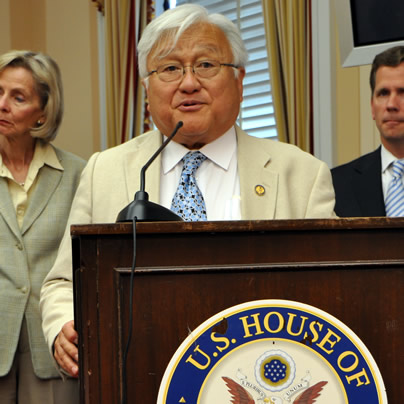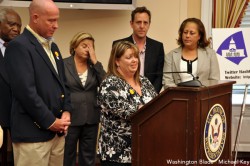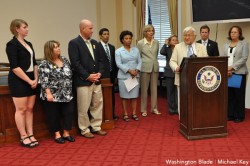National
Members of Congress launch anti-bullying caucus
Lawmakers pledge to pass legislation barring student harassment

A bipartisan group of House lawmakers led by Rep. Mike Honda (D-Calif.) launched on Thursday an anti-bullying caucus that aims to draw attention to LGBT youth and others who experience harassment.
During a news conference on Capitol Hill, Honda said lawmakers formed the Congressional Anti-Bullying Caucus, which he chairs, to carry the message against “the bullying epidemic” in schools, the workplace and assisted living facilities. Honda said stories about bullying are common among constituents of all lawmakers.
“This is going to be — from a national point of view right down to the local — a clarion call to make sure that all of us understand what this thing called bullying is,” Honda said.
Members of the caucus who spoke during the conference didn’t focus per se on the bullying of LGBT students in school — an issue that has received significant attention in recent years because of gay youths who have committed suicide after being harassed — although a few members of the caucus talked about incidents of anti-LGBT bullying in their districts.
Rep. Barbara Lee (D-Calif.) said transgender people in her district have experienced violence as a result of what she described as being bullied.
“Finally, let me just say in my own district in the last few months there have been three cases of transgendered individuals who were killed, who were killed, who were killed because of their identity, because they were bullied, and this is bad,” Lee said. “I want to make sure we all recognize that it is deadly.”
Legislation pending before Congress that aims to stop bullying against LGBT students is the Student Non-Discrimination Act, which would make LGBT status a protected class among students, and the Safe Schools Improvement Act, which would require schools to set up anti-bullying policies. In April, President Obama endorsed both pieces of legislation.
Rep. Lois Capps (D-Calif.), a former school nurse, talked about the story of Lawrence King, a gay student from California in her district, who died after being shot in 2008 by a classmate whom he asked to be his Valentine.
“His death and other similar tragedies remind us that bullying — particularly bullying directed at LGBT youth — must be stopped,” Capps said.
Capps said starting the anti-bullying caucus is “an important step,” but passage of the Safe Schools Improvement Act would be “the first thing we can do” to stop bullying.
Rep. Judy Chu (D-Calif.) said she has personal interest in stopping bullying because she has a nephew, Harry Lew, who killed himself about a year ago while serving in Afghanistan as a result of hazing.
“Two of his peers punched and kicked him, forced him to do push ups and crunches wearing his heavy full-body armor and poured the entire contents of a sandbag into his face and mouth,” Chu said. “This went on for three-and-a-half hours. Harry was serving his country and was the victim of harassment, and 20 minutes after the torment stopped, he climbed into a foxhole and killed himself. He was only 21 years old.”
As of Friday, 46 U.S. House members were among its members, including Reps. Pete Stark (D-Calif.), Rep. Keith Ellison (D-Minn.) and Del. Eleanor Holmes Norton (D-D.C.). Four Republicans are members: Reps. Ileana Ros-Lehtinen (R-Fla.), Charles Bass (R-N.H.), Robert Dold (R-Ill.) and Frank LoBiondo (R-N.J.). Following the news conference, Honda told the Washington Blade he expects more members to sign on, but didn’t disclose any names.
Ros-Lehtinen, who has a transgender son and is a co-sponsor of many pro-LGBT bills, was among the speakers at the news conference.
“We may be from different sides of the aisle, but we all believe that it is time to stand up and stop bullying — both offline and online,” Ros-Lehtinen said. “Every American deserves to live a life that is free from persecution and harassment. No one has the right to victimize others because of their gender, or their age, or their race, or creed, ethnicity or sexual orientation.”
Also present at the news conference was Lee Hirsh, director of the 2011 documentary film “Bully,” and David and Tina Long, the parents of a child, Tyler Long, who hung himself after being bullied and whose story was told during the movie.

Tina Long, mother of Tyler Long, who committed suicide after being bullied (Blade photo by Michael Key)
Long’s eyes filled with tears as she told her story.
“There is a problem and we’re going to take care of it,” Long said. “And if it takes federal legislation to make this happen, then that’s what we have to do. … We have this opportunity, and if we don’t take it, how many more parents are going to lose their children? You never want to have to bury your child for something that is preventable.”
Only one openly gay member of Congress is a member of the caucus: Rep. Jared Polis (D-Colo.). Reps. Barney Frank (D-Mass.) and Tammy Baldwin (D-Wis.) are set to leave the U.S. House at the end of this year. Scott Fay, chief of staff for Rep. David Cicilline (D-R.I.), said his boss will join the caucus at a later time.
U.S. Supreme Court
Supreme Court to consider bans on trans athletes in school sports
27 states have passed laws limiting participation in athletics programs

The U.S. Supreme Court on Thursday agreed to hear two cases involving transgender youth challenging bans prohibiting them from participating in school sports.
In Little v. Hecox, plaintiffs represented by the ACLU, Legal Voice, and the law firm Cooley are challenging Idaho’s 2020 ban, which requires sex testing to adjudicate questions of an athlete’s eligibility.
The 9th U.S. Circuit Court of Appeals described the process in a 2023 decision halting the policy’s enforcement pending an outcome in the litigation. The “sex dispute verification process, whereby any individual can ‘dispute’ the sex of any female student athlete in the state of Idaho,” the court wrote, would “require her to undergo intrusive medical procedures to verify her sex, including gynecological exams.”
In West Virginia v. B.P.J., Lambda Legal, the ACLU, the ACLU of West Virginia, and Cooley are representing a trans middle school student challenging the Mountain State’s 2021 ban on trans athletes.
The plaintiff was participating in cross country when the law was passed, taking puberty blockers that would have significantly reduced the chances that she could have a physiological advantage over cisgender peers.
“Like any other educational program, school athletic programs should be accessible for everyone regardless of their sex or transgender status,” said Joshua Block, senior counsel for the ACLU’s LGBTQ and HIV Project. “Trans kids play sports for the same reasons their peers do — to learn perseverance, dedication, teamwork, and to simply have fun with their friends,” Block said.
He added, “Categorically excluding kids from school sports just because they are transgender will only make our schools less safe and more hurtful places for all youth. We believe the lower courts were right to block these discriminatory laws, and we will continue to defend the freedom of all kids to play.”
“Our client just wants to play sports with her friends and peers,” said Lambda Legal Senior Counsel Tara Borelli. “Everyone understands the value of participating in team athletics, for fitness, leadership, socialization, and myriad other benefits.”
Borelli continued, “The U.S. Court of Appeals for the Fourth Circuit last April issued a thoughtful and thorough ruling allowing B.P.J. to continue participating in track events. That well-reasoned decision should stand the test of time, and we stand ready to defend it.”
Shortly after taking control of both legislative chambers, Republican members of Congress tried — unsuccessfully — to pass a national ban like those now enforced in 27 states since 2020.
Federal Government
UPenn erases Lia Thomas’s records as part of settlement with White House
University agreed to ban trans women from women’s sports teams

In a settlement with the Trump-Vance administration announced on Tuesday, the University of Pennsylvania will ban transgender athletes from competing and erase swimming records set by transgender former student Lia Thomas.
The U.S. Department of Education’s Office for Civil Rights found the university in violation of Title IX, the federal rights law barring sex based discrimination in educational institutions, by “permitting males to compete in women’s intercollegiate athletics and to occupy women-only intimate facilities.”
The statement issued by University of Pennsylvania President J. Larry Jameson highlighted how the law’s interpretation was changed substantially under President Donald Trump’s second term.
“The Department of Education OCR investigated the participation of one transgender athlete on the women’s swimming team three years ago, during the 2021-2022 swim season,” he wrote. “At that time, Penn was in compliance with NCAA eligibility rules and Title IX as then interpreted.”
Jameson continued, “Penn has always followed — and continues to follow — Title IX and the applicable policy of the NCAA regarding transgender athletes. NCAA eligibility rules changed in February 2025 with Executive Orders 14168 and 14201 and Penn will continue to adhere to these new rules.”
Writing that “we acknowledge that some student-athletes were disadvantaged by these rules” in place while Thomas was allowed to compete, the university president added, “We recognize this and will apologize to those who experienced a competitive disadvantage or experienced anxiety because of the policies in effect at the time.”
“Today’s resolution agreement with UPenn is yet another example of the Trump effect in action,” Education Secretary Linda McMahon said in a statement. “Thanks to the leadership of President Trump, UPenn has agreed both to apologize for its past Title IX violations and to ensure that women’s sports are protected at the university for future generations of female athletes.”
Under former President Joe Biden, the department’s Office of Civil Rights sought to protect against anti-LGBTQ discrimination in education, bringing investigations and enforcement actions in cases where school officials might, for example, require trans students to use restrooms and facilities consistent with their birth sex or fail to respond to peer harassment over their gender identity.
Much of the legal reasoning behind the Biden-Harris administration’s positions extended from the 2020 U.S. Supreme Court case Bostock v. Clayton County, which found that sex-based discrimination includes that which is based on sexual orientation or gender identity under Title VII rules covering employment practices.
The Trump-Vance administration last week put the state of California on notice that its trans athlete policies were, or once were, in violation of Title IX, which comes amid the ongoing battle with Maine over the same issue.
New York
Two teens shot steps from Stonewall Inn after NYC Pride parade
One of the victims remains in critical condition

On Sunday night, following the annual NYC Pride March, two girls were shot in Sheridan Square, feet away from the historic Stonewall Inn.
According to an NYPD report, the two girls, aged 16 and 17, were shot around 10:15 p.m. as Pride festivities began to wind down. The 16-year-old was struck in the head and, according to police sources, is said to be in critical condition, while the 17-year-old was said to be in stable condition.
The Washington Blade confirmed with the NYPD the details from the police reports and learned no arrests had been made as of noon Monday.
The shooting took place in the Greenwich Village neighborhood of Manhattan, mere feet away from the most famous gay bar in the city — if not the world — the Stonewall Inn. Earlier that day, hundreds of thousands of people marched down Christopher Street to celebrate 55 years of LGBTQ people standing up for their rights.
In June 1969, after police raided the Stonewall Inn, members of the LGBTQ community pushed back, sparking what became known as the Stonewall riots. Over the course of two days, LGBTQ New Yorkers protested the discriminatory policing of queer spaces across the city and mobilized to speak out — and throw bottles if need be — at officers attempting to suppress their existence.
The following year, LGBTQ people returned to the Stonewall Inn and marched through the same streets where queer New Yorkers had been arrested, marking the first “Gay Pride March” in history and declaring that LGBTQ people were not going anywhere.
New York State Assemblywoman Deborah Glick, whose district includes Greenwich Village, took to social media to comment on the shooting.
“After decades of peaceful Pride celebrations — this year gun fire and two people shot near the Stonewall Inn is a reminder that gun violence is everywhere,” the lesbian lawmaker said on X. “Guns are a problem despite the NRA BS.”





















